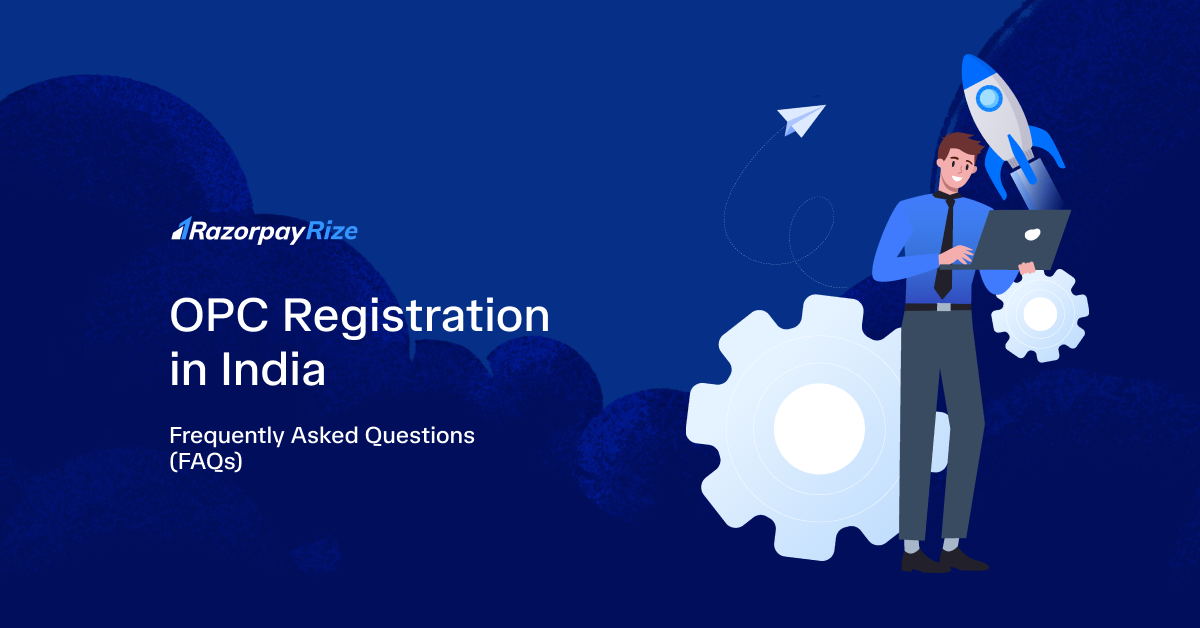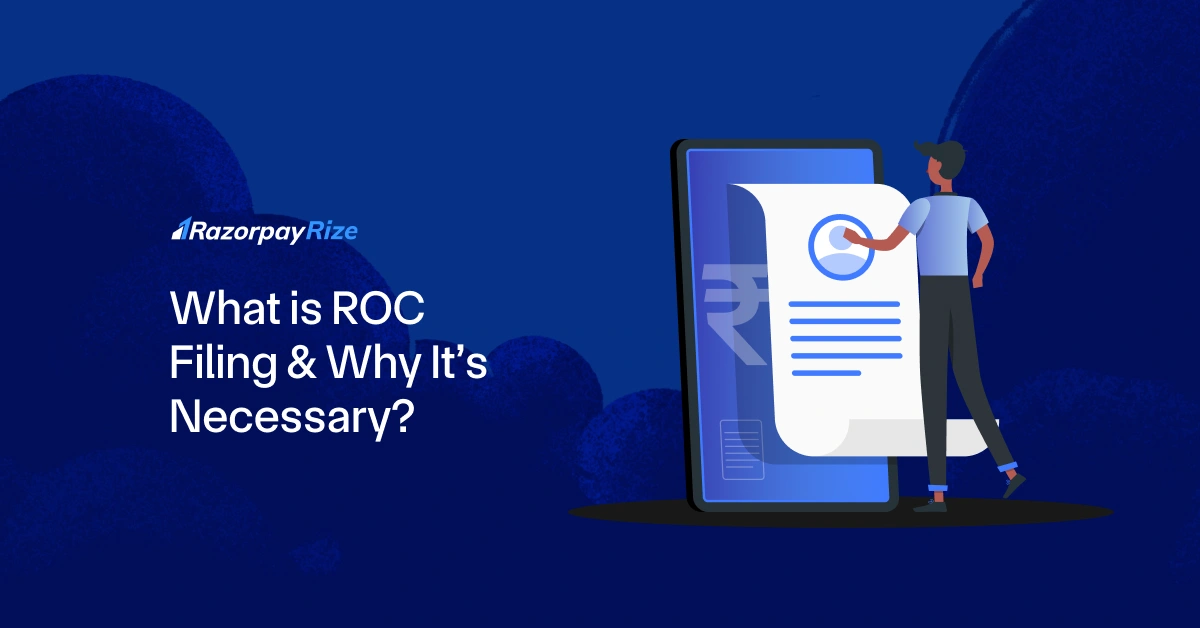Starting a business on your own is a big step. The One Person Company (OPC) is the perfect legal structure for solo founders, giving you full control without the personal risk. We know you have questions. This FAQ guide covers everything you need to know about registering your OPC in India, from eligibility to annual compliance.
Table of Contents
Section 1: FAQs on Understanding OPC: The Basics
Start with these foundational FAQs. Understand what a One Person Company (OPC) is, its key benefits, and how it compares to a sole proprietorship.
1. What is a One Person Company (OPC)?
A One Person Company (OPC) is a business structure introduced under the Companies Act, 2013, that allows a single individual to own and manage a company with limited liability. It offers the benefits of a private limited company while requiring only one shareholder.
2. What are the main benefits of registering an OPC?
Following are the key advantages of registering as an One Person Company:
- Limited liability protection for the owner.
- Separate legal entity distinct from the owner.
- Single ownership with control, no need for multiple partners.
- Ease of raising funds compared to sole proprietorships.
- Perpetual succession, as the nominee takes over in case of the death/incapacity of the owner.
3. What is the difference between OPC and Sole Proprietorship?
- An OPC is a separate legal entity, distinct from its owner, whereas a sole proprietorship and its owner are legally the same.
- An OPC provides limited liability protection, meaning the owner’s personal assets are generally safe from business liabilities; a sole proprietorship does not offer this protection.
- An OPC has higher credibility in the eyes of banks, investors, and clients, making raising funds easier than a sole proprietorship.
Related Read: Difference Between Sole Proprietorship and One Person Company
4. OPC vs. Private Limited Company: What's the main difference?
The main difference is the number of members. An OPC has only one member, while a Private Limited Company requires a minimum of two. This makes an OPC ideal for solo founders. However, a Private Limited Company is often preferred for raising external equity funding, as investors are more familiar with that structure.
Related Read: Private Limited Company vs. One Person Company (OPC)
Section 2: FAQs on OPC Eligibility & Structure
These frequently asked questions cover who is eligible to start an OPC in India, from residency requirements to the mandatory role of a nominee.
5. Who can register an OPC in India?
Only a resident Indian citizen can register an OPC. The person must:
- Be at least 18 years old.
- Not be a member of more than one OPC.
- Nominate another Indian citizen as a nominee.
6. Can a foreign citizen or NRIs register an OPC in India?
No, only resident Indian citizens can incorporate an OPC.
7. How many members are required to start an OPC?
An OPC can be formed with only one member. Additionally, a nominee must be appointed at the time of incorporation.
8. Does an OPC need to have a nominee?
Yes, every OPC must appoint a nominee at the time of incorporation. The nominee takes over the company in case of the owner’s death or incapacity.
9. Can a minor become a member or nominee in an OPC?
No, a minor cannot become a member or nominee of an OPC.
10. Can an OPC have directors?
Yes, an OPC can have up to 15 directors. However, it must have at least one director (the sole shareholder can also be the director).
11. Are there any business activities an OPC cannot do?
An OPC cannot engage in non-banking financial (NBFI) activities, investment activities (including investing in securities of other companies), or be converted into a Section 8 (non-profit) company
Section 3: FAQs on OPC Registration: Process, Documents & Cost
Find answers to common questions about the OPC registration process, from the documents required and step-by-step filing to the overall cost and timeline.
12. What is the process of OPC registration?
The process to register a One Person Company generally involves the following steps:
- Obtain a Digital Signature Certificate (DSC) for the proposed director.
- Get the company name approved using the SPICe+ Part A form.
- Prepare the Memorandum of Association (MOA) and Articles of Association (AOA).
- Submit the incorporation application SPICe+ Part B to the Ministry of Corporate Affairs (MCA).
- Receive the Certificate of Incorporation, which marks the official formation of the OPC.
13. What are the common documents required for OPC registration?
Documents generally include:
- PAN and Aadhaar of the member and nominee
- Proof of registered office (rental agreement/electricity bill)
- Passport-size photograph of the member and nominee
- Identity and address proof of directors
14. What is the minimum capital requirement for OPC registration?
There is no minimum paid-up capital requirement to register an OPC in India.
15. How long does it take to register an OPC in India?
On average, OPC registration takes 7–10 working days, subject to MCA approval timelines.
16. What is the cost of registering an OPC in India?
The OPC registration cost varies depending on professional fees and government charges, usually ranging from ₹10,000 to ₹15,000.
17. Is stamp duty applicable for OPC registration?
Yes, stamp duty applies on the MOA and AOA, and it varies depending on the state where the OPC is registered.
Section 4: FAQs on Post-Registration of OPC: Compliance & Tax
Registered your OPC? This section answers frequently asked questions about the mandatory annual compliance, tax filings (like GST and PAN/TAN), and penalties.
18. How is an OPC taxed?
An OPC is taxed as a separate legal entity, just like a Private Limited Company. The profits are taxed at the corporate tax rate (as per the prevailing Income Tax Act), and not in the hands of the individual owner.
19. What are the annual compliance requirements for an OPC?
An OPC must comply with MCA rules, which include:
- Filing of Annual Return (Form MGT-7A).
- Filing of Financial Statements (Form AOC-4).
- Statutory audit of accounts.
- Income tax return filing.
20. What happens if an OPC fails to file annual compliance?
Non-compliance may result in:
- Penalties under the Companies Act
- Fines for late filing of annual returns and financial statements
- Possible legal action by the MCA
21. Are PAN and TAN required for an OPC?
Yes, an OPC must obtain a Permanent Account Number (PAN) and Tax Deduction and Collection Account Number (TAN) for tax compliance.
22. Is GST registration mandatory for an OPC?
GST registration is required only if the OPC meets the turnover threshold (currently ₹40 lakh for goods, ₹20 lakh for services) or operates in a category that mandates GST.
Section 5: FAQs on Finance, Funding & Conversions of One Person Company (OPC)
Explore the future of your company. These FAQs cover how an OPC can raise funds and the process for converting it into a private or public limited company.
23. Can an OPC issue shares to investors?
An OPC cannot directly issue shares to the public or convert into a public company. However, it can raise funds through private placement or by converting into a private limited company.
24. Can an OPC issue debentures or take loans from banks?
Yes, an OPC can raise funds through loans or private debentures, but it cannot issue shares to the public.
25. Can an OPC be converted into another type of company?
Yes, an OPC can be converted into:
- Private Limited Company, or
- Public Limited Company This is subject to conditions under the Companies Act, such as crossing certain thresholds (e.g., paid-up share capital of ₹50 lakh or average annual turnover exceeding ₹2 crore).
Related Read: Conversion of OPC to a Private Limited Company
26. Can an OPC be converted back into a proprietorship?
No, once incorporated as an OPC, it cannot revert to a sole proprietorship. Conversion is only possible into a private or public limited company.
27. What is the role of the nominee, and can the nominee be changed later?
The nominee's role is to take over the company in the event of the sole member's death or incapacity, ensuring business continuity. Yes, the nominee can be changed at any time by the member by filing the required forms with the MCA.
Private Limited Company
(Pvt. Ltd.)
- Service-based businesses
- Businesses looking to issue shares
- Businesses seeking investment through equity-based funding
Limited Liability Partnership
(LLP)
- Professional services
- Firms seeking any capital contribution from Partners
- Firms sharing resources with limited liability
One Person Company
(OPC)
- Freelancers, Small-scale businesses
- Businesses looking for minimal compliance
- Businesses looking for single-ownership
Private Limited Company
(Pvt. Ltd.)
- Service-based businesses
- Businesses looking to issue shares
- Businesses seeking investment through equity-based funding
One Person Company
(OPC)
- Freelancers, Small-scale businesses
- Businesses looking for minimal compliance
- Businesses looking for single-ownership
Private Limited Company
(Pvt. Ltd.)
- Service-based businesses
- Businesses looking to issue shares
- Businesses seeking investment through equity-based funding
Limited Liability Partnership
(LLP)
- Professional services
- Firms seeking any capital contribution from Partners
- Firms sharing resources with limited liability
















